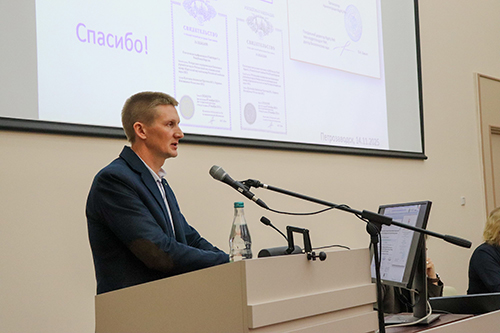The educational spot “Hard to see, yet very dangerous” on Kizhi Island offered information on an invasive species – potato cyst nematode Globodera rostochiensis Woll., a hazardous potato pest subject to both exterior and interior quarantine.
Locals and tourists could take a look at the parasitic roundworm at the main stage of its life cycle – cyst (through a binocular microscope) and were told how they can themselves determine how much the soil is infected by nematode cysts. Visitors of this spot were told about the domestically applicable ways to control the parasite, and information about this invasive species was disseminated (flyers). Brief info about the DIAS project was handed over to the Kizhi Open Air Museum and Vodlozersky National Park. After giving a master class with basic information on potato cyst nematode, soil samples from potato fields were collected from residents of nearby villages for accurate determinations of the infection and working out of recommendations for controlling pest numbers. A mini experiment was established in one private plot to develop environment-friendly methods for controlling potato cyst nematode populations.
Karelia Cross-border Cooperation Programme is financed by the European Union, the Russian Federation and the Republic of Finland.
News

June 13, 2019
On June 5, 2019 KarRC RAS staff participating the project “DIAS - Collaborative Data and Information Exchange Network for Managing Invasive Alien Species ” under ENI Karelia CBC Programme took part in the EcoKizhi environmental education event organized by the Kizhi Open Air Museum in the framework of the World Environment Day.
See also:

November 14, 2025
Karelian zoologists find out how the wolf population maintains its viability in the current situation
KarRC RAS Learned Council had a meeting on November 14. Is opened with a ceremony of handing awards from the Russian Ministry of Science and Higher Education, RAS, and Head of the Republic of Karelia to researchers. The scientific agenda was a presentation on changes in the wolf population genetic structure in response to growing hunting delivered by Head of Zoology Laboratory, Institute of Biology KarRC RAS, Konstantin Tirronen.
KarRC RAS Learned Council had a meeting on November 14. Is opened with a ceremony of handing awards from the Russian Ministry of Science and Higher Education, RAS, and Head of the Republic of Karelia to researchers. The scientific agenda was a presentation on changes in the wolf population genetic structure in response to growing hunting delivered by Head of Zoology Laboratory, Institute of Biology KarRC RAS, Konstantin Tirronen.







